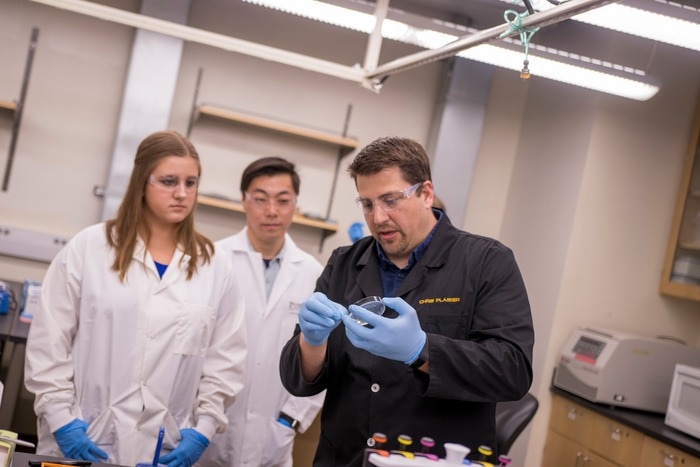Healthy food and exercise habits can have a big impact on a person’s general health. However, an individual’s genetics largely determines their chance of developing cancer.
 Arizona State University’s Christopher Plaisier, shown at right, is developing a software platform that uses genetic data--such as abnormal gene fusions as well as mutations that affect protein expression and how many times a gene is copied--to improve cancer modeling. Image Credit: Arizona State University
Arizona State University’s Christopher Plaisier, shown at right, is developing a software platform that uses genetic data--such as abnormal gene fusions as well as mutations that affect protein expression and how many times a gene is copied--to improve cancer modeling. Image Credit: Arizona State University
Human bodies are continually replicating the genes to create new cells. However, there are occasional errors in those copies, which geneticists refer to as a mutation.
In some instances, these errors can cause proteins to be altered, genes to fuse, and the amount of a gene copied to change, eventually increasing a person’s chance of developing cancer. By creating predictive models for tumor activity, scientists can gain improved awareness of the effect of mutations.
Christopher Plaisier, an assistant professor of biomedical engineering at Arizona State University’s Ira A. Fulton Schools of Engineering, is working on a software tool called OncoMerge that utilizes genetic data to enhance cancer modeling technology.
OncoMerge is a tool that finds mutations that impact protein expression and how frequently a gene is replicated, along with abnormal gene fusions. The software then examines the network underlying the mutations to identify connections and create a model that predicts upcoming changes caused by the mutations.
We are able to look at the gene expression patterns using correlation. Then we can see what is being activated or repressed, which allows us to look at the deeper functions behind that.”
Christopher Plaisier, Assistant Professor, Biomedical Engineering, Arizona State University
Plaisier first became conscious of the need for a framework that could handle the network underlying mutations while working on his postdoctoral study. Since that time, he has been contemplating the notion of OncoMerge. His skills as a cancer biologist, computational biologist, and human geneticist are all combined into one endeavor in this attempt.
His most recent work develops a database that utilizes genetic information to examine linked behavior within networks to address difficulties in gene mutation discovery. On April 4th, 2023, the findings are released in the journal Cell Reports Methods.
Data-driven Discovery
Numerous possible healthcare applications can be made using the insight gained from studying genetics, but comprehending cancer is one of their most important uses. Plaisier is improving prediction algorithms that can shed light on particular cancer environments because there is a substantial difference in the types of cancer.
When creating OncoMerge, his team confirmed that the feedback networks of specific genomic regions had been strengthened to generate an abnormal regulation of networks. This selective growth indicated how the tumor controlled its surroundings to survive.
The team’s techniques have been tested using OncoMerge on over 9,000 patient tumors, and the results show that incorporating mutation data did increase the precision of predictions for linked behavior among genes.
Plaisier anticipates that his software will ultimately be used to analyze cancer mutation pipelines, improve accuracy, and process genomic information in individual cells.
Data Science in Education
Plaisier wants to progress data science education along with enhancing cancer modeling methods. He wants to develop a data science elective course for students of biomedical engineering and has been a vocal advocate for the inclusion of basic coding classes in all disciplines to better familiarize students with coding techniques.
The interdisciplinary method is highly regarded by Sierra Wilferd, a biological design graduate student in Plaisier’s lab.
Seeing how cancer biology and bioinformatics interact has taught me the importance of applying lab skills and computational skills to ask and answer interesting questions.”
Sierra Wilferd, Graduate Research Associate, Ira A. Fulton Schools of Engineering, Arizona State University
The ability to gather and comprehend biological data is essential for battling diseases since humans are incredibly complicated biological systems. Plaisier’s OncoMerge software could have a pivotal role in the genomics data pipeline for research studies of patient tumors and significantly influence all cancer genomics studies.
Source:
Journal reference:
Striker, S. S., et al. (2023). Systematic integration of protein-affecting mutations, gene fusions, and copy number alterations into a comprehensive somatic mutational profile. Cell Reports Methods. doi.org/10.1016/j.crmeth.2023.100442